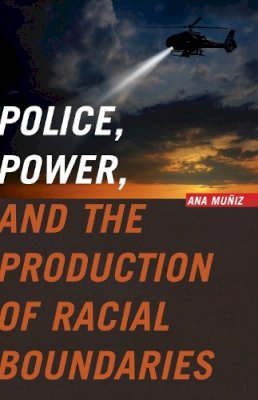
Stock image for illustration purposes only - book cover, edition or condition may vary.
Police, Power, and the Production of Racial Boundaries
Ana Muñiz
€ 49.51
FREE Delivery in Ireland
Description for Police, Power, and the Production of Racial Boundaries
Paperback. .
Based on five years of ethnography, archival research, census data analysis, and interviews, Police, Power, and the Production of Racial Boundaries reveals how the LAPD, city prosecutors, and business owners struggled to control who should be considered “dangerous” and how they should be policed in Los Angeles. Sociologist Ana Muñiz shows how these influential groups used policies and everyday procedures to criminalize behaviors commonly associated with blacks and Latinos and to promote an exceedingly aggressive form of policing.
Muñiz illuminates the degree to which the definitions of “gangs” and “deviants” are politically constructed labels born of public policy and court decisions, offering an innovative look at the process of criminalization and underscoring the ways in which a politically powerful coalition can define deviant behavior. As she does so, Muñiz also highlights the various grassroots challenges to such policies and the efforts to call attention to their racist effects. Muñiz describes the fight over two very different methods of policing: community policing (in which the police and the community work together) and the “broken windows” or “zero tolerance” approach (which aggressively polices minor infractions—such as loitering—to deter more serious crime). Police, Power, and the Production of Racial Boundaries also explores the history of the area to explain how Cadillac-Corning became viewed by outsiders as a “violent neighborhood” and how the city’s first gang injunction—a restraining order aimed at alleged gang members—solidified this negative image. As a result, Muñiz shows, Cadillac-Corning and other sections became a test site for repressive practices that eventually spread to the rest of the city.
Muñiz illuminates the degree to which the definitions of “gangs” and “deviants” are politically constructed labels born of public policy and court decisions, offering an innovative look at the process of criminalization and underscoring the ways in which a politically powerful coalition can define deviant behavior. As she does so, Muñiz also highlights the various grassroots challenges to such policies and the efforts to call attention to their racist effects. Muñiz describes the fight over two very different methods of policing: community policing (in which the police and the community work together) and the “broken windows” or “zero tolerance” approach (which aggressively polices minor infractions—such as loitering—to deter more serious crime). Police, Power, and the Production of Racial Boundaries also explores the history of the area to explain how Cadillac-Corning became viewed by outsiders as a “violent neighborhood” and how the city’s first gang injunction—a restraining order aimed at alleged gang members—solidified this negative image. As a result, Muñiz shows, Cadillac-Corning and other sections became a test site for repressive practices that eventually spread to the rest of the city.
Product Details
Publisher
Rutgers University Press
Format
Paperback
Publication date
2015
Series
Critical Issues in Crime and Society
Condition
New
Number of Pages
154
Place of Publication
New Brunswick NJ, United States
ISBN
9780813569758
SKU
V9780813569758
Shipping Time
Usually ships in 7 to 11 working days
Ref
99-50
About Ana Muñiz
ANA MUÑIZ was a Soros Justice Fellow at the Open Society Foundation and Youth Justice Coalition. She is the director of the Dream Resource Center at the UCLA Labor Center, an institute for research, education, and advocacy on undocumented youth immigrant issues in Los Angeles, California.
Reviews for Police, Power, and the Production of Racial Boundaries
"The genius of Police, Power, and the Production of Racial Boundaries is in the author's skillful analysis on the 'other side' of the criminal justice system. This book stands out precisely because it turns a critical eye toward the creators and enforcers of the law."
Christopher Bickel
assistant professor of sociology, California State University, San Marcos
"In a compelling, nonacademic way, Police, Power, and the Production of Racial Boundaries blows the lid off gang suppression policies in Los Angeles. Through a combination of personal narrative and rigorous scholarship, Ana Muniz reveals how gang injunctions have hurt minority communities and fomented racial tensions for a generation. A fabulous book that I couldn't put down, it is a must-read for every public defender or civil rights lawyer representing teenagers accused of gang activities."
Sean Kennedy
Executive Director, Center of Juvenile Law & Policy , Loyola Law School
Christopher Bickel
assistant professor of sociology, California State University, San Marcos
"In a compelling, nonacademic way, Police, Power, and the Production of Racial Boundaries blows the lid off gang suppression policies in Los Angeles. Through a combination of personal narrative and rigorous scholarship, Ana Muniz reveals how gang injunctions have hurt minority communities and fomented racial tensions for a generation. A fabulous book that I couldn't put down, it is a must-read for every public defender or civil rights lawyer representing teenagers accused of gang activities."
Sean Kennedy
Executive Director, Center of Juvenile Law & Policy , Loyola Law School
